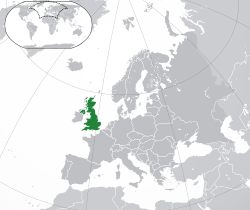Britain's nuclear program
| United Kingdom | |
|---|---|
 |
|
| Nuclear program start date | 10 April 1940 |
| First nuclear weapon test | 3 October 1952 |
| First fusion weapon test | 15 May 1957 |
| Last nuclear test | 26 November 1991 |
| Largest yield test | 3 Mt (13 PJ) (28 April 1958) |
| Total tests | 45 detonations |
| Peak stockpile | 520 warheads (1970s) |
| Current stockpile (usable and not) | 215 warheads (2016) |
| Current strategic arsenal | 120 usable warheads (2016) |
| Maximum missile range | 12,000 km (7,500 mi) (UGM-133 Trident II) |
| NPT party | Yes (1968, one of five recognised powers) |
The United Kingdom was the third country to test an independently developed nuclear weapon, in October 1952. It is one of the five nuclear-weapon states under the NPT and a permanent member of the UN Security Council. Since the 1958 US–UK Mutual Defence Agreement, the United States and the United Kingdom have cooperated extensively on nuclear security matters. The special relationship between the two countries has involved the exchange of classified scientific data and materials such as plutonium.
The UK retains a stockpile of 215 thermonuclear warheads, of which 120 are operational as of 2016, but has refused to declare the exact size of its arsenal. Since 1998, the Trident nuclear programme has been the only operational nuclear weapons system in British service. The delivery system consists of four Vanguard class submarines based at HMNB Clyde in Scotland. Each submarine is armed with up to 16 Trident II missiles, each carrying warheads in up to eight MIRV re-entry vehicles. With at least one submarine always on patrol, the Vanguards perform a strategic deterrence role and are also believed to have a sub-strategic capability. In contrast with the other permanent members of the United Nations Security Council, the United Kingdom operates only a submarine-based delivery system, having decommissioned its tactical WE.177 free-fall bombs in 1998.
...
Wikipedia
